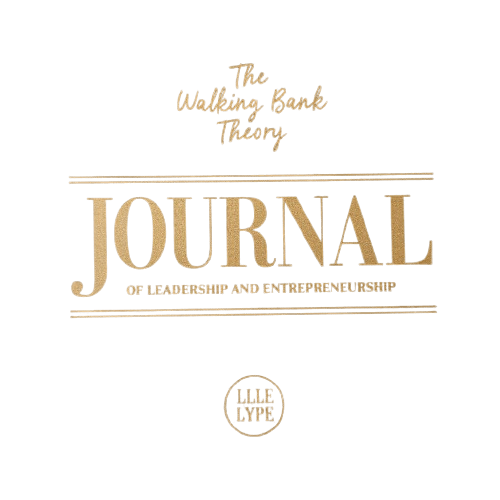

SUBSCRIBE
Get journal updates
The Walking Bank Journal of Leadership and Entrepreneurship serves as a dynamic platform dedicated to exploring the intersections of self-monetization, personal development, and entrepreneurial leadership. Our journal aims to foster a vibrant academic and entrepreneurship community that values innovative research and practical insights, while also promoting the application of the Walking Bank Theory in real-world contexts.


The Walking Bank Theory, developed by Alicia Marie Phidd, posits that every individual possesses a unique set of talents, akin to a personal 'bank' capable of generating value and 'printing money.' This article explores the theory's core principles, emphasizing self-reliance, entrepreneurship, and the monetization of one's talents for personal and societal benefit. The article then examines the theory's relevance in the context of the evolving AI landscape, highlighting the importance of viewing AI as a tool for empowerment rather than a threat. It argues that continuous learning and skill development are crucial for navigating the challenges presented by AI and maximizing individual potential in the rapidly changing workplace.
Latest Issue
Abstract
OPEN ACCESS


Journal Homepage
Submit Paper
The Walking Bank Theory:
A Leadership Doctrine for the AI Age and
the Importance of Continuous Learning
The Walking Bank Theory, developed by Alicia Marie Phidd, posits that every individual possesses a unique set of talents, akin to a personal 'bank' capable of generating value and 'printing money.' This article explores the theory's core principles, emphasizing self-reliance, entrepreneurship, and the monetization of one's talents for personal and societal benefit. The article then examines the theory's relevance in the context of the evolving AI landscape, highlighting the importance of viewing AI as a tool for empowerment rather than a threat. It argues that continuous learning and skill development are crucial for navigating the challenges presented by AI and maximizing individual potential in the rapidly changing workplace.
Abstract
DOWNLOAD PDF
KEEP READING
Keywords
Introduction
Walking Bank Theory, Leadership, AI, Continuous Learning, Skill Development, Talent Monetization, Self-Reliance, Entrepreneurship, Intrapreneurship.
The world of work is undergoing a profound transformation, driven by the rapid advancement of artificial intelligence (AI). This technological revolution presents both challenges and opportunities for individuals seeking to navigate a rapidly changing landscape. While some fear the potential for job displacement, others see AI as a powerful tool for enhancing productivity and unlocking new avenues for creativity and innovation. In this context, the Walking Bank Theory, developed by Alicia Marie Phidd, offers a compelling framework for leadership and self-empowerment in the AI age.
The Walking Bank Theory challenges conventional notions of leadership by emphasizing the inherent potential within each individual. It encourages individuals to embrace their unique talents and develop them into sources of value creation. This approach, grounded in self-reliance and entrepreneurship, seeks to empower individuals to become 'Walking Bank Theorists,' actively monetizing their talents for personal and societal benefit.
This article explores the core principles of the Walking Bank Theory, examining its application in the context of the evolving AI landscape. It argues that the theory's emphasis on continuous learning and skill development is crucial for navigating the challenges and opportunities presented by AI. By embracing a mindset of continuous learning and leveraging the power of AI, individuals can reach their full potential and thrive in a rapidly changing world.


PRODUCT 2
Lorem ipsum dolor sit amet, consectetur adipiscing elit. Ut rutrum odio quis dignissim mattis.Lorem ipsum dolor sit amet, consectetur adipiscing elit. Ut rutrum odio quis dignissim mattis.
REF: L4C32A
DATA SHEET
Do you have any doubts?
Contact us



PRODUCT 3
Lorem ipsum dolor sit amet, consectetur adipiscing elit. Ut rutrum odio quis dignissim mattis.Lorem ipsum dolor sit amet, consectetur adipiscing elit. Ut rutrum odio quis dignissim mattis.
REF: D37SCL
DATA SHEET
Do you have any doubts?
Contact us


PRODUCT 4
Lorem ipsum dolor sit amet, consectetur adipiscing elit. Ut rutrum odio quis dignissim mattis.Lorem ipsum dolor sit amet, consectetur adipiscing elit. Ut rutrum odio quis dignissim mattis.
REF: C5F9RT
DATA SHEET
Do you have any doubts?
Contact us



Stay Informed & Up To Date